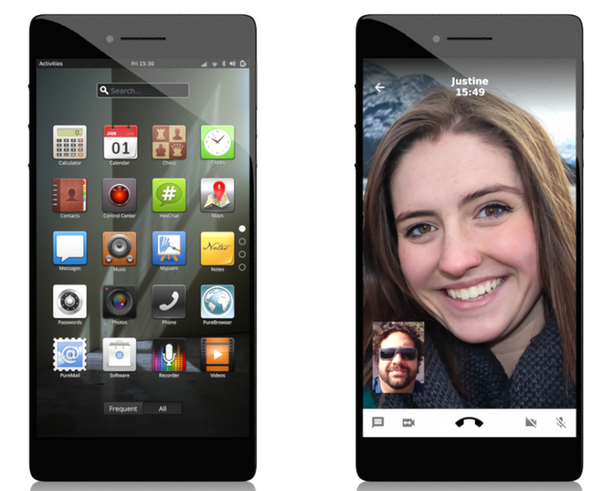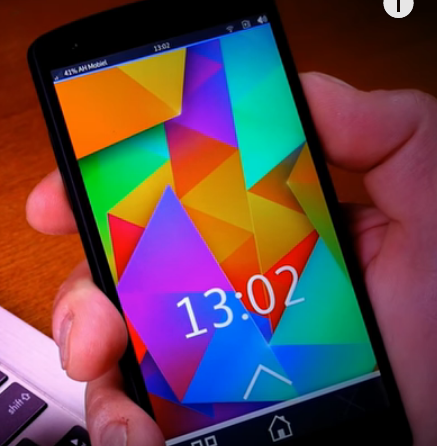Librem 5 and the Challenge of the Free Phone
Exploring the Librem 5 Free Phone
ByThe Librem 5 will be completely free,
Free laptops and workstations, from the firmware to the operating system, are rare, but they do exist, as the Free Software Foundation’s Respect Your Freedom certification demonstrates. Completely free phones, however, are still struggling to exist. Jolla makes phones with free software, but the license makes clear that its Sailfish operating system also includes proprietary software. Technoethical is struggling to produce a free phone but has yet to produce one, whereas Canonical’s efforts to fund the high-end Ubuntu Edge failed several years ago. Now, however, Purism, known as the successful maker of open hardware laptops, is crowdfunding in partnership with KDE and Gnome to produce the Librem 5, a phone that is not only free, but also private and secure.
Purism has become known in the last few years for its high-end laptops, the Librem 11 through 15. These four projects have received more than $2.5 million in funding and have been a critical success, as well. Early in the company’s history, complaints were made that its firmware was not free, but according to Todd Weaver, Purism’s CEO, “we have been shipping Coreboot [a free BIOS] as default on our products for the past nine months and are the most free hardware available” currently. This default will also apply to the Librem 5, which the campaign page describes as “a fully standards-based freedom-oriented system” (Figure 1).
Such a phone is needed, Weaver says, because “the current mobile landscape is a dark, nightmarish place, where two large for-profit corporations control everything, Google Android and Apple iOS. Phones know more about us than any other device on the planet, and there is no ethical alternative. In the server, laptop, desktop, and router space, the world has convenient options, so ethical choices can be made. In the phone market there is no convenient option; Purism’s Librem 5 intends to be that option.”
Raising the Bar
To be a free phone, the Librem 5 will not use Android, although free versions of Android (e.g., Lineage OS, formerly CyanogenMod) do exist. “That is a short-term and short-sighted solution that does not actually improve the future for digital rights, or ethical computing,” says Weaver. Free versions of Android typically lag behind proprietary ones, and security in Android as a whole is often lax. To avoid such problems, the Librem 5 will run PureOS, a Debian-based distribution that emphasizes security – a choice that also means, as with the Ubuntu Touch, that the Librem 5 can be expected to act more like a laptop or workstation than other phones.
Moreover, as though building a free phone is not enough, Purism is increasing the challenge by emphasizing user choice and security. Users will be able to install other distributions “with ease,” says Weaver. Moreover, besides the innate security advantages of a Linux distribution and the availability of tools like the Tor browser and Privacy Badger, the Librem 5 is designed with numerous other security features. Applications will run in isolation, so that the compromising one will not allow access to the entire system. Additional security will be provided by a VPN service, default IP-based communication, and end-to-end encryption. Uniquely, among phones, the Librem 5 will also separate the CPU from the Baseband processor and include hardware kill switches for WiFi/BT, the webcam, the microphone, and Baseband.
“It all comes down to control and convenience,” Weaver says. “By bundling together a product that protects users by default, running free software where the source code is available into a convenient product, we offer an easy-to-use product that the user controls, not the parent company.” Purism, Weaver emphasizes, “is a Social Purposes Corporation, not a traditional for-profit corporation,” meaning that its self-appointed ethical standards are as important to it as profits.
Gnome and Plasma Mobile
In addition to its privacy and security features, the Librem 5 is partnering with Gnome and KDE to bring these desktops to the phone.
Gnome needs no introduction and is well-suited to mobile devices. In fact, its use of a working and overview desktop seems modelled on mobile interfaces, and the project has already ventured into mobile computing with the Nokia 770, N800 and N900, the One Laptop Per Child project’s XO laptop, and FIC’s Neo1973 mobile phone. If the Librem 5 is funded, a media release by the GNOME Foundation explains, it “plans to enhance GNOME shell and general performance of the system with Purism to enable features on the Librem 5.”
Various Gnome technologies are used extensively in embedded devices today, and Gnome developers have experienced some of the challenges that face mobile computing, specifically with the Nokia 770, N800 and N900; the One Laptop Per Child project’s XO laptop; and FIC’s Neo1973 mobile phone.
KDE’s partnership, though, may be more problematic. Purism will be including not KDE’s standard Plasma desktop environment, but Plasma Mobile, a recent project that is still in development. According to KDE developer Sebastian Kügler, Plasma Mobile’s reference implementation currently runs only on the “LG NexusX, Nexus 5, and, thanks to the Halium project, which is a hardware abstraction to allow Plasma Mobile to run on devices which are currently only supported by Android, the number of supported devices is growing.” If all goes as planned, the Librem 5 is probably going to be “the first phone to ship with Plasma Mobile out of the box.” Still, Weaver expresses his confidence that Plasma Mobile will be available “within the timeframe needed to get product into users’ hands.”
Few people have seen Plasma Mobile. However, from the videos available online, Plasma Mobile features touchscreen support – obviously – and swiping from the edges, reminiscent of both Ubuntu Touch and Plasma Active, KDE’s previous attempt to provide a mobile interface. Its development benefits because it shares “more than ninety percent” of its code with Plasma, the sub-system for KDE’s graphical interface on the desktop (Figure 2). First introduced in KDE 4.0, Plasma is designed to abstract the interface from the rest of the system, making it easy to exchange interfaces. Unsurprisingly, it has a history of doing just that, not only with Plasma Active, but also with Plasma Netbook, which suggests that readying Plasma Mobile for the Librem 5’s proposed shipping date in January 2019 should offer no insolvable problems.
The main advantage of both Gnome and Plasma Mobile over Android and iOS is that they are developed as open source, which at least theoretically should offer greater privacy and control over data, both of which should appeal to individual users and corporations alike with a need to control their data and communicate securely.
In fact, by using these two interfaces, the Librem 5 may accomplish the goal of convergence – a single interface for all devices – that Canonical has recently abandoned. That would be particularly ironic in the case of Gnome, to which Canonical’s Ubuntu distribution has returned while stopping convergence development. However, as Kügler points out while talking about Plasma Mobile, convergence may be an idea whose time has finally arrive. “It takes a learning curve for users, and, I think, advancements in technology to bring it to market,” Kügler says. “You need rather powerful hardware, the right connectors, and the right hardware components, so it’s not an easy end-goal. [However], the path to convergence already bears huge benefits, as it means more efficient development, more consistency across different form factors, and higher quality code.”
Answering Doubts
As I write, the Librem 5 campaign has raised just over 64% of its goal of $1.5 million. Although the alliances with Gnome and Plasma Mobile can be taken as strong votes of confidence, the campaign’s announcement has sparked debate about whether such an ambitious project can succeed where so many others have failed.
Weaver’s response is that Purism can benefit from past mistakes and is in a better position than similar projects. Thanks to crowdfunding, the Librem 5 does not need to sell tens of thousands of phones to be a success, and advances in both computing power and software like Plasma Mobile have made development easier than in the past. According to Weaver, the project should also benefit from its clearly defined goals and the the fact that “the awareness of privacy and security concerns are at an all-time high.”
A similar concern is what I call the Arts and Crafts Dilemma, after the idealistic design movement at the start of the Twentieth Century: To deliver small runs of ethical products, manufacturers have to charge high prices that keep their products out of the hands of most buyers.Weaver admits that “we do have to charge prices that are higher than [would be] possible if we had huge volumes.” However, he adds that “we are comparable in price to other high-end hardware from Apple, Dell, and Lenovo, and our Librem 5 phone is significantly less than some mobile phone offerings.” For example, the forthcoming Apple X will retail at $999, compared with the Librem 5’s $599.
In the end, Weaver says, “people fund Purism products because they believe what we believe – that ethical products are important – so we can leverage that to form a beach-head, and expand up into the supply chain, and pass on volume discounts to users in the future. It is a strong, long-term business strategy, designed to change the future for the better.” It is also an ambitious project, whose emphasis on privacy and security is finally becoming generally appealing. Whether the Librem 5 campaign succeeds or fails, it seems certain to have a major influence on the entire idea of the fully free phone.
Subscribe to our Linux Newsletters
Find Linux and Open Source Jobs
Subscribe to our ADMIN Newsletters
Support Our Work
Linux Magazine content is made possible with support from readers like you. Please consider contributing when you’ve found an article to be beneficial.

News
-
Asahi Linux Runs into Issues with M4 Support
Due to Apple Silicon changes, the Asahi Linux project is at odds with adding support for the M4 chips.
-
Plasma 6.3.4 Now Available
Although not a major release, Plasma 6.3.4 does fix some bugs and offer a subtle change for the Plasma sidebar.
-
Linux Kernel 6.15 First Release Candidate Now Available
Linux Torvalds has announced that the release candidate for the final release of the Linux 6.15 series is now available.
-
Akamai Will Host kernel.org
The organization dedicated to cloud-based solutions has agreed to host kernel.org to deliver long-term stability for the development team.
-
Linux Kernel 6.14 Released
The latest Linux kernel has arrived with extra Rust support and more.
-
EndeavorOS Mercury Neo Available
A new release from the EndeavorOS team ships with Plasma 6.3 and other goodies.
-
Fedora 42 Beta Has Arrived
The Fedora Project has announced the availability of the first beta release for version 42 of the open-source distribution.
-
Dash to Panel Maintainer Quits
Charles Gagnon has stepped away as maintainer of the popular Dash to Panel Gnome extension.
-
CIQ Releases Security-Hardened Version of Rocky Linux
If you're looking for an enterprise-grade Linux distribution that is hardened for business use, there's a new version of Rocky Linux that's sure to make you and your company happy.
-
Gnome’s Dash to Panel Extension Gets a Massive Update
If you're a fan of the Gnome Dash to Panel extension, you'll be thrilled to hear that a new version has been released with a dock mode.


